Dear Amnesty Activists and supporters
Please take urgent action to stop Eritrean asylum-seekers being deported to Eritrea, where they would face torture and imprisonment. Here is a sample letter. Please also look at our Write for Rights case from Türkiye. After the last elections in Poland the government changed, but there are no improvements for refugees stuck in the swampy forests between Poland and Belarus, violently pushed back from both sides. Just today, Donald Tusk, the new Prime Minister of Poland announced that he wants to suspend the right to asylum, a grave violation of European and international human rights law. More details and reports below.
2 dates for your diaries : the Amplify Human Rights Festival on 7th December where we are contributing a workshop on Fortress Europe, and the screening of the Film “Green Border” at the Human Rights Action Centre on 16th January.
Türkiye
Urgent Action:- Eritrean asylum seekers in Türkiye at imminent risk of forcible return home
by Chris Ramsey
Hundreds of Eritrean nationals are at imminent risk of forcible return from Türkiye to Eritrea where they would face a real risk of torture, arbitrary detention and other serious human rights violations. Reports indicate that around 300 Eritreans recently detained in Türkiye without adequate access to communication or legal support have been deported to Eritrea. Amnesty says the authorities must immediately halt any plans to forcibly return Eritrean nationals from Türkiye and grant them access to asylum procedures, in line with international law.
Türkiye is party to the 1951 Refugee Convention and its 1967 Protocol. However, Türkiye retains a geographic reservation to its ratification of the Convention, so that only citizens from Council of Europe member states are allowed to apply for refugee status. People who do not qualify for refugee status in Türkiye, can request conditional refugee status or subsidiary protection under the Law on Foreigners and International Protection of 2013. The conditional refugee status was created for people originating from “non-European” states and provides more restrictive rights than the ones granted to refugee status holders.
Amnesty International has found that the Eritrean authorities regard the act of applying for asylum abroad as evidence of treason, and a reason to detain anyone forcibly returned to Eritrea. Appalling detention conditions in Eritrea amount to cruel, inhuman or degrading treatment. The United Nations High Commissioner for Refugees (UNHCR) has noted that “Eritreans who are forcibly returned may, according to several reports, face arrest without charge, detention, ill-treatment, torture sometimes death at the hands of the authorities. They are reportedly held incommunicado, in over-crowded and unhygienic conditions, with little access to medical care, sometimes for extended periods of time” and that “For someEritreans, being outside the country may be sufficient cause on return to be subjected to scrutiny, reprisals and harsh treatment. Individuals may be suspected of having sought asylum, participating in diaspora-based opposition meetings or otherwise posing a (real or perceived) threat to the Government, particularly where they have exited the country illegally.”
Furthermore, in 2015, the UN Human Rights Council Commission of Inquiry on human rights in Eritrea found that ‘’with a few exceptions, those who have been forced to return to the country have been arrested, detained and subjected to ill- treatment and torture.’’ According to a 2016 Amnesty International report, deserters are likely to face prolonged arbitrary detention, inhumane detention conditions and torture and other-ill treatment. National service is compulsory for all men and women between the ages of 18 and 40 in Eritrea, with additional mandatory reserve duties up to age 50. There is no limit on length of service. Initially 18 months long, it generally includes six months’ military service followed by 12 months’ deployment in military or government service. However, this is frequently extended indefinitely.
National service often involves forced or involuntary labour in state projects. Conscripts perform construction labour on government projects such as road building, work in the civil service or work for companies owned and operated by the military or ruling party elites. Conscripts are paid minimal salaries that do not meet the basic needs of their families. Much of the adult population of Eritrea is currently engaged in mandatory national service. There is no exemption from military service for conscientious objectors.
ACTION:
Use this model letter to the Head of Migration Management in Türkiye requesting that the country fulfils its international obligations with respect to refugees and desists from deporting people back to Eritrea.
Write for Rights 2024: Prof Şebnem Korur Fincancı
A priority case for Amnesty UK
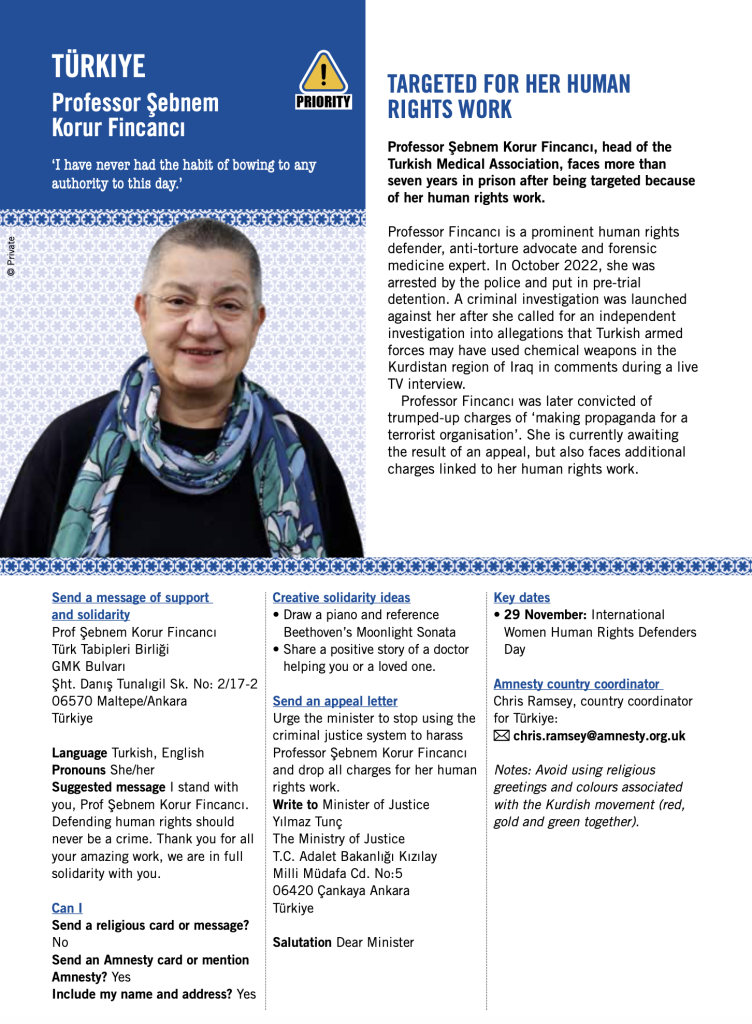 Some of you will recall from previous newsletters that Prof Şebnem Korur Fincancı is a woman human rights defender and the President of the Turkish Medical Association. She is a member and the former head of the Turkish Human Rights Foundation. She is also one of the founding members of the Forensic Doctors’ Association and has played a major role in the development of the Istanbul Protocol, which sets the United Nations reference standards on the investigation and documentation of the cases of torture. She has conducted forensic investigations, at times undercover, to expose torture in multiple countries.
Some of you will recall from previous newsletters that Prof Şebnem Korur Fincancı is a woman human rights defender and the President of the Turkish Medical Association. She is a member and the former head of the Turkish Human Rights Foundation. She is also one of the founding members of the Forensic Doctors’ Association and has played a major role in the development of the Istanbul Protocol, which sets the United Nations reference standards on the investigation and documentation of the cases of torture. She has conducted forensic investigations, at times undercover, to expose torture in multiple countries.
On 11 January 2023, Istanbul 24th Heavy Penal Court sentenced Prof Fincancı to 2 years 8 months 15 days imprisonment on charges of “making propaganda for a terrorist organisation” under article 7/2 of the Law on the Fight Against Terrorism. This was simply because of her remarks during a live interview she gave to Medya News TV on 19 October 2022 in which she called for an independent investigation into allegations that Turkish armed forces might have used chemical weapons in Kurdistan Region of Iraq. The woman human rights defender was accused of “terrorist propaganda” and “degrading the Turkish nation, the State of Turkish Republic and the Institutions of the State”. The investigation was initiated following the complaint made by the Ministry of Defence.
Thankfully the court also ruled for her release from prison while she is appealing against her sentence.
Amnesty International is calling for the Turkish government to stop using the criminal justice system to harass Professor Şebnem Korur Fincancı and drop all charges for her human rights work.
Prof Fincancı is going to be included in this year’s Write for Rights campaign and with this newsletter I am giving you advanced sight of her case page that you will see when the booklet is circulated at the end of October. Also, I am delighted to be able to tell you that her case is one of the 3 that Amnesty UK will be focussing on and giving priority in national Write for Rights publicity during the campaign period. Because of this you will see this case featured in national printed and digital advertising and on social media.
ACTIONS
- Please can you now begin to think how you can best use the national prominence that this case will have over the next few months to enhance your campaigning not just for Prof Fincancı but on human rights in Türkiye generally.
- Please ensure that you have ordered plenty of copies of the Write for Rights booklets from Amnesty UK.
- Consider organising an event on 29 November International Women Human Rights Defenders Day.
- Consider who in your area you might be able to promote this case to to gather support eg local medical professionals.
I will send out a further update on campaigning on this case when I have more information on the national plans from Amnesty UK
Council of Europe: New Secretary General
On 18 September 2024, Alain Berset assumed the position of Secretary General of the Council of Europe (CoE), Europe’s oldest intergovernmental organisation representing 46 member states, for a five-year mandate. He was elected by the Parliamentary Assembly of the Council of Europe (PACE) on 25 June.
In reporting his appointment the European Journal of International Law gave the following, sadly depressing, assessment of the Human Rights situation in Türkiye with an equally negative conclusion about the likelihood of the Council of Europe having much appetite for taking strong action to try to improve the situation:
“Then there is the question of Türkiye, which has steadily distanced itself from its membership obligations in particular since the failed coup of 2016. There are 139 leading judgments pending implementation by Türkiye, with an average time of leading cases pending at almost 8 years according to EIN. The case of Osman Kavala is of particular concern, as he has been deprived of his liberty since 18 October 2017 and remains in detention despite the Court’s unequivocal findings in the Kavala (Article 46 § 4) judgment. In June 2024, the Committee of Ministers noted that Türkiye remains “in serious breach of its obligations under the Convention,” which clearly leaves open the possibility of triggering a sanction procedure under Article 8 of the Statute unless Türkiye complies. The appetite for sanctions is almost nil at the level of Committee of Ministers, but what remains of the CoE’s credibility if it is not willing to stand decisively up for its values?”
Poland
One year on from Poland’s elections, and no change has happened to improving human rights. by Lucja Jastrzebska
In many areas – such as social, economic, defence and migration policy – Poland’s new government differs very little from its predecessor in style and substance. And in places where it does differ, it has been unable to implement its agenda.
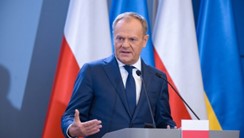
Something similar could be said about Donald Tusk’s current ruling coalition, which, despite coming to power last year with the promise of a fresh start after eight years of rule by Law and Justice (PiS), has in many ways been a continuation of the former PiS (Law and Justice) government by other means.
On migration, Tusk has continued the rhetoric and policies of PiS. Shortly after coming to office, he declared that the “survival of Western civilisation” depends on preventing “uncontrolled migration”. In line with the PiS approach, he has also referred to migrants as part of “hybrid warfare” launched by Belarus and Russia against Poland and the EU.
Read the opinion piece here: https://notesfrompoland.com/2024/10/11/polands-tusk-government-is-not-so-different-from-its-pis-predecessor-opinion/
Poland: Submission to the UN Human Rights Committee, 142nd session, 14 October – 7 November 2024, list of issues prior to reporting
Amnesty International submits this information to the UN Human Rights Committee ahead of the adoption of the list of issues prior to reporting for Poland. It focuses on the rights to freedom of expression, association, and peaceful assembly, women’s rights, equality and non-discrimination, access to an effective remedy, the rights of refugees and migrants, and the right to privacy.
Summary of key points:
Migrants and Refugees:
Since 2017 there have been ongoing reports of Polish authorities intercepting people seeking international protection at Poland’s border with Belarus, mainly in Terespol. Amnesty International reported “evidence of abuses [that] highlight[ed] ‘hypocrisy’ of unequal treatment of asylum seekers”, with authorities violating rights of asylum seekers, including strip searches and other degrading treatment, in overcrowded detention centres. Nearly all people Amnesty International spoke with reporting “consistently disrespectful and verbally abusive behaviour, racist remarks and other practices that indicated psychological ill-treatment”.
Gender Equality:
Poland has one of Europe’s most restrictive abortion laws. In Poland today, abortion is only legal when the health or the life of the pregnant person is at risk or when the pregnancy is the result of rape or incest. Performing your own abortion or the possession of abortion pills for a self-managed abortion is not a crime under Polish law, but any person or doctor who helps pregnant people with an abortion outside the two permitted grounds in the law may face up to three-years in prison. In practice, however, it is almost impossible for those eligible for a legal abortion to obtain one. Every year thousands of women leave Poland to access abortion care in other European countries, while others import medical abortion pills or seek extra-legal abortion in Poland. Polish women, particularly those in difficult socio-economic situations, have to depend on the crucial help from civil society organizations, with often limited resources, such as Justyna Wydrzyńska who supported a pregnant woman, who said she had been suffering from domestic violence, to access abortion pills and was accused and found guilty of the offence of helping with abortion.
Under Polish law, rape is defined as “bringing another person to sexual intercourse” by “violence, unlawful threat or deception”. The aggravated forms of this crime, which carry more severe penalties. This is not consistent with a consent-based definition of rape, and with what international human rights law standards require. One consequence of the wording of Article 197 is that trials tend to focus on how the victim “resisted” and how the perpetrator “overcame that resistance”. Prosecutors and judges, concentrate on establishing whether the alleged perpetrator used force, illegal threats or deceit to overcome the victim’s “resistance”. This leads the authorities to focus not on the survivor’s absence of consent, but rather on the level of opposition, how that was communicated, and for how long. An amendment to this law has recently been passed but has not yet entered into force. As per the new definition, which unequivocally recognizes that sex without consent is rape, rape is defined as “bringing another person to sexual intercourse by violence, unlawful threat, deception or otherwise despite the lack of his or her consent”.
Read the full report and Amnesty’s recommendations here: https://www.amnesty.org/en/documents/eur37/8418/2024/en/
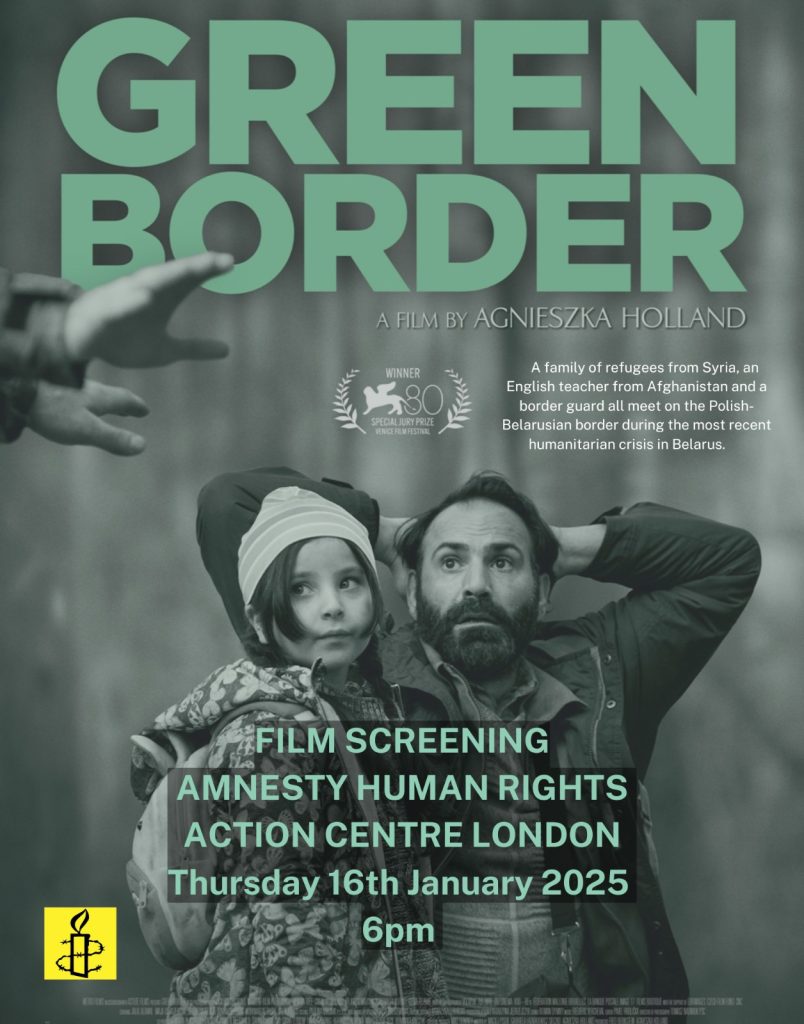 Call to Action: Film Screening- Green Border
Call to Action: Film Screening- Green Border
We are delighted to invite you to the film screening of Green Border, directed by Agnieszka Holland.
Film summary: A family of refugees from Syria, an English teacher from Afghanistan and a border guard all meet on the Polish-Belarusian border during the most recent humanitarian crisis in Belarus.
When: Thursday 16th January 2025
Where: Amnesty Human Rights Centre, Shoreditch London
Time: 6pm-9pm
There will be a reflection of the film with our Central Europe Country Coordinator and a representative from POMOC tbc.
We would love to see as many of you there as possible. Please contact us to claim your space.
Fortress Europe
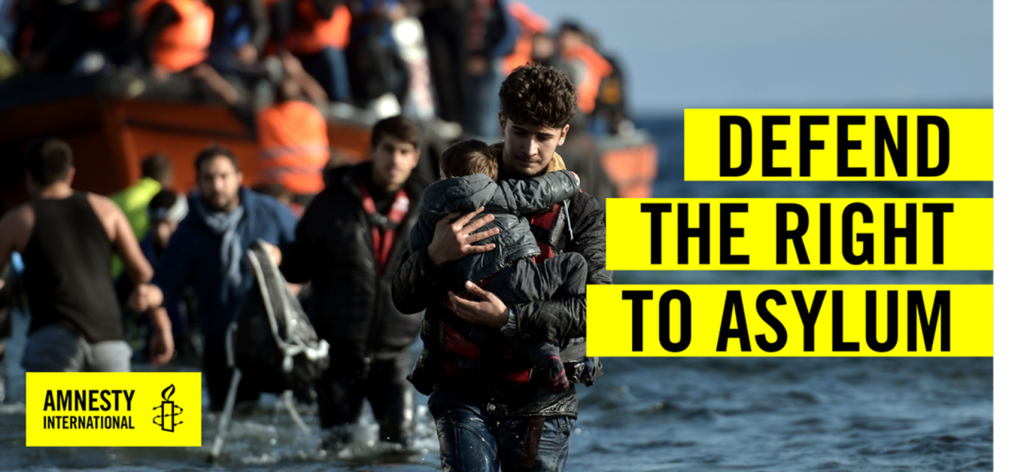
Seeking asylum is a human right!
by Ulrike Schmidt
War , oppression and violence as well as the environmental devastation caused by climate change is forcing people to leave their homes and try to find safety and a place to rebuild their lives in another country. The vast majority of refugees are hosted in poor countries , just a small minority tries to get to Europe, hoping that their human rights would be respected there. But instead of compassion, Fortress Europe’s policies are designed to keep refugees out at all cost, including their lives. Violent pushbacks at the borders including organised murder (Greece). Dodgy deals with Libya and Tunesia are abandoning people to torture and extortion. The Mediterranean sea is a graveyard of people who had no option but risk drowning rather than certain death where they fled from. And in nearly all European countries politicians use refugees as scapegoats to deflect from un related economic problems, creating resentment and hate.
I am organising a workshop at Amnesty’s Human Rights festival Amplify
The session aims to unpack the systemic, trans-national mechanisms that buttress ‘Fortress Europe’ (e.g. surveillance, police brutality, islamophobia, racism) and spotlight how activists are organising against this across borders. We have secured the participation of Gracie Mae Bradley, founding member of the grassroots Against Borders for Children campaign and former Director of civil liberties NGO Liberty, and Refugee Action. I will be chairing the session.
Please find more information about the festival here :
https://www.amnesty.org.uk/amplify-human-rights-festival
Please find below the link to buy tickets for Amplify:
https://www.woolwich.works/events/amplify-human-rights-festival
Implementation of Amnesty AGM resolution 9 Please give me feedback!
AGM 2024
Feedback please on how best to support local groups
At the AGM I presented the following resolution to the membership, and it received overwhelming support .
“Support, empower and re-vitalise Local groups to meet the Human Right challenges of the present and future.”
Background : Local groups have been the life-blood of Amnesty for many years. Through local groups we can reach deep into communities to shape the narrative, to make the case for Human Rights. Local groups can carry, spread and expand Amnesty campaigns and win MPs as well as communities throughout the country for our causes. Recently though many groups have been shrinking, many have closed down.
The AGM requests that Amnesty takes urgent measures to support groups and help them to expand across the generations through:
- Training programs for Amnesty activists to prepare them to take organisational and leadership roles
- 5 Regional organisers (at least part-time paid) to support groups, organise inspiring regional conferences, help coordinate large-scale protests, stunts and campaigns.
- Maintain and grow democratic decision-making processes for local groups.
I will now be working with staff and the board on the implementation of this resolution, and I want to get it right. Please discuss in your groups and let me know what support is most beneficial.
My question:
Would your group benefit from the support a regional organiser could provide?
Which areas of work would you like to be supported with?
How can we help local groups to grow and reverse the decline of the last few years?
Stop the Far Right
(demonstration not organised by Amnesty)
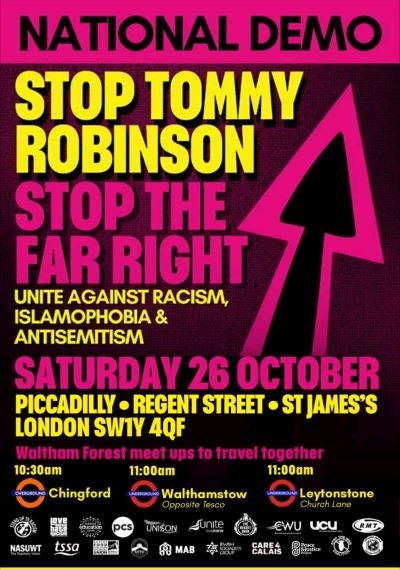
Last not least : The violent riots and pogroms of early August this year have shocked all of us. We know that they were instigated by well-known far-right instigators, particularly Tommy Robinson, amplified by Farage and Elon Musk, who was advocating civil war.
The far right riots were stopped largely by people coming out in large numbers to defend their communities. Most of the counter-demonstrations were organised by Stand up to Racism. On 26th October Tommy Robinson wants to march with 20000 supporters to Parliament Square spreading hate against refugees and migrants.
Stand up to Racism is organising a counter demonstration which will peacefully demonstrate that we are the majority. We need more than 20000 people to join us. This is not an Amnesty International demonstration, but many members will be there, and I will be involved in stewarding. Hope to see you there.
Best wishes Ulrike Schmidt Country Coordinator for the Balkans, Greece and Mediterranean sea
Jovana Bosnjak Country Coordinator for Western Europe; Chris Ramsey Country Coordinator for Türkiye, Vice-Chair Country Coordinators Forum; Lucja Jastrzebska Country Coordinator for Central Europe
AIUK Europe on social media:
https://www.facebook.com/AmnestyUKEurope